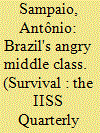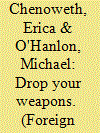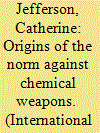| Srl | Item |
| 1 |
ID:
132471


|
|
|
|
|
| Publication |
2014.
|
| Summary/Abstract |
The recent protests show that secure democracy and an absence of extremism are no guarantee of domestic stability.
On 26 May 2014, just a few weeks ahead of the World Cup, an angry crowd surrounded the Brazilian football team in Rio de Janeiro. Striking teachers attacked the team bus as it left the city's international airport, protesting the government's vast expenditure on preparations for the event and neglect of the education system. Heavily armed military police were called in to clear a path for the vehicle, and have followed the players ever since. For many Brazilians, passion for football was supplanted by demands for better infrastructure, salaries and quality of life: the 12 June Brazil-Croatia game that opened the tournament followed a year in which one person was killed and hundreds were estimated to have been injured in demonstrations around the country. This article went to press before the four-week-long competition had finished; football mania was at the time returning to Brazil. The country's mood was likely to be affected by the final result.
|
|
|
|
|
|
|
|
|
|
|
|
|
|
|
|
| 2 |
ID:
132148


|
|
|
|
|
| Publication |
2014.
|
| Summary/Abstract |
Over the past three years, the world has witnessed a surge of nonviolent resistance movements. Pictures of huge demonstrations in public squares have become a staple of international news broadcasts, and Time named "the protester" as its Person of the Year for 2011. These days, it seems that at any given moment, thousands of people are mobilizing for change somewhere in the world.
|
|
|
|
|
|
|
|
|
|
|
|
|
|
|
|
| 3 |
ID:
131443


|
|
|
|
|
| Publication |
2014.
|
| Summary/Abstract |
The use of chemical weapons in Syria in August 2013 led to calls for a tough international response in order to uphold the norm against what is often portrayed as a particularly odious form of warfare. The condemnation of poison weapons has a long history and this article examines the origins of the international norm against their use. It focuses particularly on the proceedings of the first Hague Peace Conference and suggests that this represented the emergence of an important distinction between the customary norm against poison and poisoned arms, and a newly codified norm against the use of asphyxiating gas projectiles, which was primarily an attempt to limit the potential of new weapons technologies. However, psychological responses to the wide-scale use of chemical weapons in the First World War underscored a deep revulsion to this form of warfare and blurred the distinction between gas projectiles and poison. While the Hague Conventions ultimately failed to avert the use of chemical weapons, the formation of the 1925 Geneva Protocol reaffirmed the norm against the use of poison in war and represented both a legal and moral condemnation of chemical and biological weapons that continues to be enshrined in international law today.
|
|
|
|
|
|
|
|
|
|
|
|
|
|
|
|